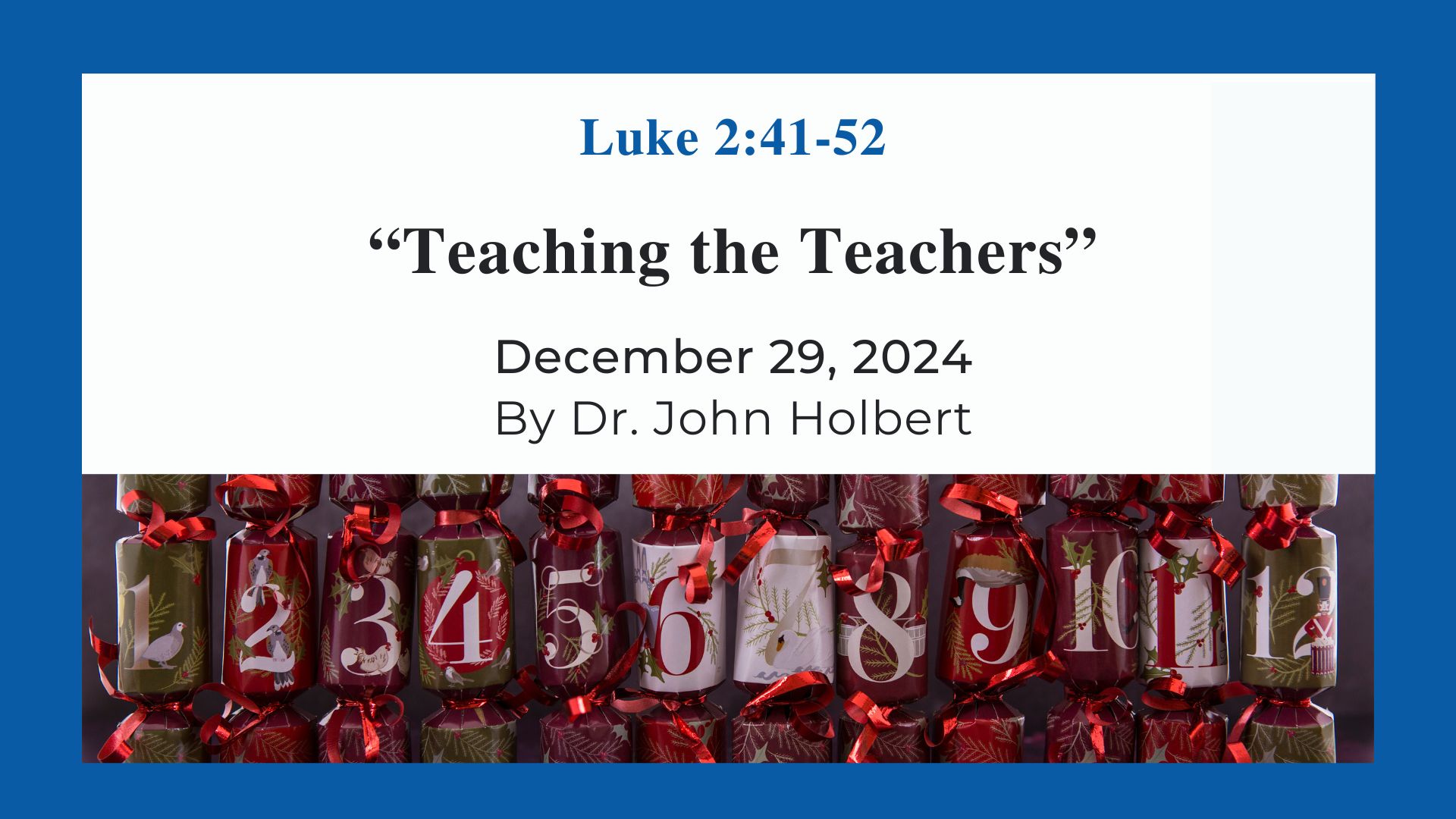Teaching the Teachers - Reflections on Luke 2:41-52, Christmas 1, Year C
by John Holbert on Monday, December 2, 2024

Unlike the Gospel of Mark, surely one of Luke’s sources in the composition of his work, Luke supplies an extensive story of the youthful Jesus hiding from his parents, remaining alone in Jerusalem, and conversing in the Temple “among the teachers” (Luke 2:46). The word Luke uses for “teachers” here is unique; in all other places in the gospel the word describes John (3:12) or more often Jesus himself (7:40, 8:49 among many others). Luke wants to be certain that we know these men in the temple are serious practitioners and scholars of the religious law. The 12-year-old Jesus is thoroughly capable of holding his own intellectually with these temple masters. Such stories are hardly unusual among other Hellenistic biographies where a hero’s early life gives evidence of his (or her) later significance (see e.g. Philo’s Life of Moses). However, the tale is unique among the four gospels.
The tale unfolds quite simply but with considerable dramatic flair. The family of Jesus has come “as usual” to Jerusalem for the Passover celebration, a journey they make each year. During this spring event, the population of Jerusalem swelled to double or triple its normal size, creating considerable dangers of conflict between the Roman masters of the city and the restive Jewish celebrants. Later, of course, Jesus will return at Passover and the conflicts will become deadly. But this year, the festival comes off well and safely, and the family heads home, along with “relatives and acquaintances,” clearly members of the wider community of Jesus’ home village. The number is large enough to disguise the fact that Jesus has stayed behind. For one whole day, the crowd travels the road toward home, but finally his parents head back toward Jerusalem, anxiously looking for their lost child, perhaps fearing the worst in the vast festival crowds.
They search three days for him (a small resurrection reference?), and finally find him in the “temple precincts sitting among the teachers. He was listening to them and questioning them” (Luke 2:46). In short, not only is Jesus apparently unaware that he has caused his parents deep anxiety, he is also calmly playing the role of teacher, listening and questioning. He is thus a functioning rabbi, accepted in the circle of the learned. But his parents are not the least bit calm. In fact, when they saw him, they were “utterly astonished,” from a Greek verb that includes in it surprise, shock, and stupefaction with a sense of a complete lack of comprehension. “Child, why have you treated us this way?” his mother Mary cries with obvious anguish and no little anger (2:48). “Your father and I, filled with pain, have been seeking you” (2:48)!
Jesus’ reply is odd, both difficult in the Greek and as difficult to comprehend even when the Greek can finally be translated. “Why have you been seeking me,” he first says. Well, duh! The obvious answer to that is: we were afraid for your life! Now comes the odd phrase. “Did you not know that I must involve myself in my father’s interests?” (2:49). That reading is found in the footnote of the NRSV, though the main NRSV translation is the more familiar “in my father’s house.” The parents’ reply to that is: “They did not grasp what he said to them” (Luke 2:50). I would suggest that we, the reader, do not either understand Jesus’s comment! What does he mean by the “father’s affairs or interests?” It might also be understood as “my father’s associates” (i.e. relatives?). The Greek says literally, “in the things of my father.” I suggest that what could be meant is that “the father’s affairs” are precisely what Jesus is currently doing, namely joining the Jewish teachers in rabbinic conversation. This activity, of course, is what Jesus will do throughout and especially at the end of his ministry; he will respond to questions asked of him in the temple (Luke 20:1-45), and he will teach in the temple (Luke 19:47, 21:37, among others).
Of course, for Jesus to suggest that somehow God is his father, in the presence of his earthly father and mother would be shocking, yet the literary theme of ignorance in the face of Jesus is sounded, as well. Over and again Luke will say that even the most faithful people around Jesus will not be able to understand just what he is saying and implying in his teaching and in his seemingly miraculous activity. Still, the end of this story has Jesus rejoin his family on the way home, but the reader is then told, “His mother kept all things in her heart,” just as she did when confronted by the shepherds after Jesus’s birth (2:19). And Jesus, “made progress (grew) in wisdom and stature and in favor both with God and with people,” a clear echo of the growth of Samuel due in part to the yearly gift of a hand-made cloak from his mother (1 Sam.2:26). Like Hannah, Samuel’s mother, so Mary plays a role in the growth of Jesus, though her role is perhaps less obvious.
The scene of Jesus at age twelve in the temple of Jerusalem has led to any number of paintings, musical compositions, and stories through the centuries. For Luke, it plays a significant role as a prefiguring of who precisely this Jesus is and what he will become. His precocious joining with teachers of his day suggests that he will master the language of those teachers, but will eventually move well beyond them, according to Luke, and become something greater than any of them, a true teacher of teachers.
